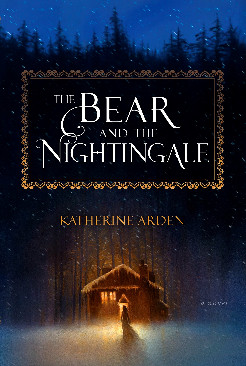It was late winter in northern Rus’, the air sullen with wet that was neither rain nor snow. The brilliant February landscape had given way to the dreary gray of March, and the household of Pyotr Vladimirovich were all sniffling from the damp and thin from six weeks’ fasting on black bread and fermented cabbage. But no one was thinking of chilblains or runny noses, or even, wistfully, of porridge and roast meats, for Dunya was to tell a story.
That evening, the old lady sat in the best place for talking: in the kitchen, on the wooden bench beside the oven. This oven was a massive affair built of fired clay, taller than a man and large enough that all four of Pyotr Vladimirovich’s children could have fit easily inside. The flat top served as a sleeping platform; its innards cooked their food, heated their kitchen, and made steam-baths for the sick.
“What tale will you have tonight?” Dunya inquired, enjoying the fire at her back. Pyotr’s children sat before her, perched on stools. They all loved stories, even the second son, Sasha, who was a self-consciously devout child, and would have insisted—had anyone asked him—that he preferred to pass the evening in prayer. But the church was cold, the sleet outside unrelenting. Sasha had thrust his head out-of-doors, gotten a faceful of wet, and retired, vanquished, to a stool a little apart from the others, where he sat affecting an expression of pious indifference.
The others set up a clamor on hearing Dunya’s question: “Finist the Falcon!” “Ivan and the Gray Wolf!” “Firebird! Firebird!” Little Alyosha stood on his stool and waved his arms, the better to be heard over his bigger siblings, and Pyotr’s boarhound raised its big, scarred head at the commotion. But before Dunya could answer, the outer door clattered open and there came a roar from the storm without. A woman appeared in the doorway, shaking the wet from her long hair. Her face glowed with the chill, but she was thinner than even her children; the fire cast shadows in the hollows of cheek and throat and temple. Her deep-set eyes threw back the firelight. She stooped and seized Alyosha in her arms.
The child squealed in delight. “Mother!” he cried. “Matyushka!” Marina Ivanovna sank onto her stool, drawing it nearer the blaze. Alyosha, still clasped in her arms, wound both fists around her braid. She trembled, though it was not obvious under her heavy clothes. “Pray the wretched ewe delivers tonight,” she said. “Otherwise I fear we shall never see your father again. Are you telling stories, Dunya?”
“If we might have quiet,” said the old lady tartly. She had been Marina’s nurse, too, long ago.
“I’ll have a story,” said Marina at once. Her tone was light, but her eyes were dark. Dunya gave her a sharp glance. The wind sobbed outside. “Tell the story of Frost, Dunyashka. Tell us of the frost-demon, the winter-king Karachun. He is abroad tonight, and angry at the thaw.”
Dunya hesitated. The elder children looked at each other. In Russian, Frost was called Morozko, the demon of winter. But long ago, the people called him Karachun, the death-god. Under that name, he was king of black midwinter who came for bad children and froze them in the night. It was an ill-omened word, and unlucky to speak it while he still held the land in his grip. Marina was holding her son very tightly. Alyosha squirmed and tugged his mother’s braid.
